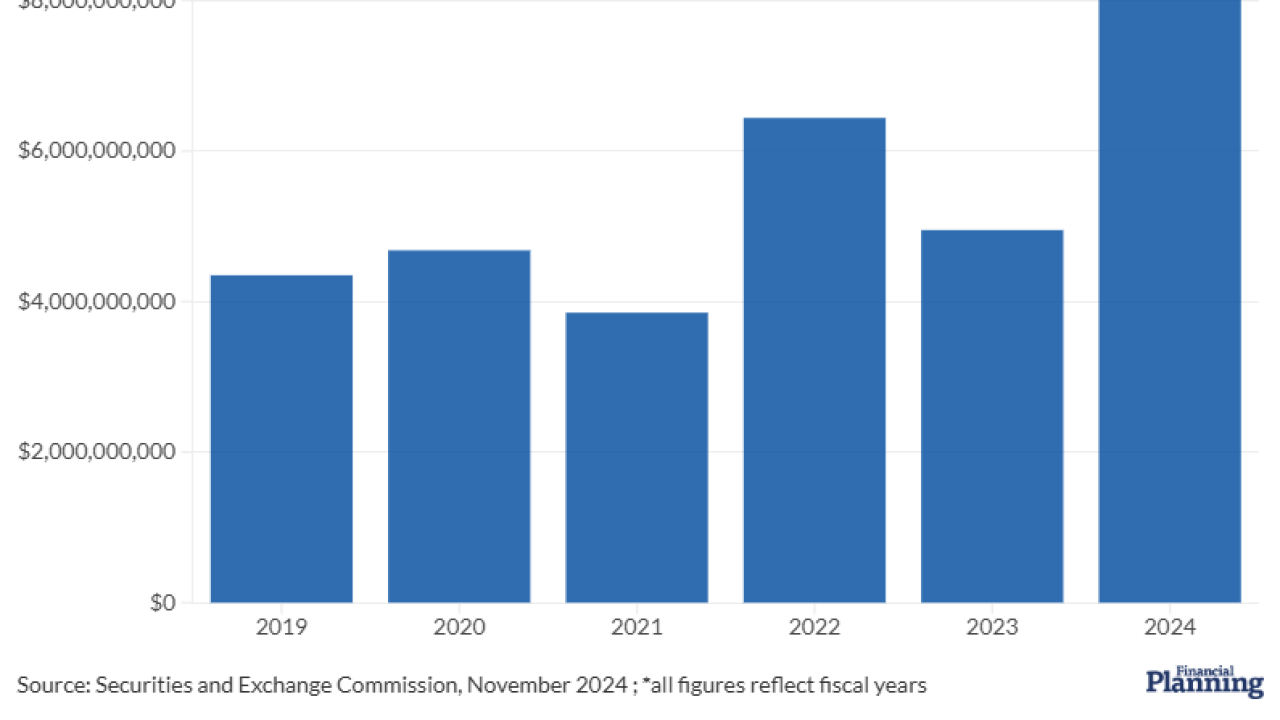Hedge fund companies Haidar Capital Management and Haidar Capital Advisors, along with their owner, Said Haidar, have settled mutual fund trading charges by the Securities and Exchange Commission with a fine of $4.58 million. Haidar and his companies, however, neither admitted to nor denied the charges.
The SEC said that the companies earned profits of $3.3 million on $143 million in rapid mutual fund trades between 2001 and 2003 and that to shield its activity, the company created eight subsidiaries to carry out these trades, used broker/dealers with multiple registered representative numbers and also placed trades through variable annuities.
Haidar placed a majority of these trades with Southwest Securities, which, in 2005, paid $10 million to settle charges that it failed to supervise brokers who permitted abusive trades.
"We believe this settlement is in the best interests of our investors and our companies," Shawn Pattison, a Haidar spokesman, told Reuters."We note that the settlement places no restrictions on our business, and, as always, we remain focused on generating superior returns for our shareholders."
Fugitive Hedge Fund Exec
Finally Nabbed in Austria
Michael Berger, whose hedge fund went bust in January 2000 and lost $400 million and who has been a fugitive since March 2002, was caught and arrested in Austria.
Berger, 35, launched Manhattan Investment Fund in 1996, and the fund suffered huge losses when Berger bet against technology and Internet stocks. Austrian native Berger pled guilty to charges of securities fraud in a Manhattan court in 2000 and then fled to Austria.
"He was in hiding. It took quite a long time until we hit on where he was," Gerald Hesztera, a spokesman for Austria's federal police, told Reuters. "We were seeking him for five years, together with the FBI."
In the 1990s, Berger raised $575 million from investors by overstating the performance and market value of the hedge fund's holdings, prosecutors stated in proceedings against Berger in 2000.
He admitted in his guilty plea that he sent out deceptive statements to investors. He tried retracting the plea a year later, saying he was mentally incompetent at the time he admitted guilt. A judge rejected his motion, stating that there was no evidence that he was not competent at the time of his plea.
He was released on bail but did not show up at court for his March 1, 2002 sentence hearing.
Since Berger is an Austrian national, he cannot be sent back to the U.S., where he would face up to 10 years in jail and minimum fines of $1.25 million plus reimbursement. Nonetheless, Vienna-based Bank Austria lost money in his scheme and has charged him with fraud as well.
R.I. Fines Morgan Stanley
$250K Over Fund Sales
Rhode Island has fined Morgan Stanley $250,000 for not supervising two Providence brokers who, regulators said, engaged in unethical and dishonest practices when selling mutual funds and variable annuities, Reuters reports.
The fine stems from an investigation begun three years ago following complaints from four investors. In one instance, an investor said a broker sold them low-cost products but then moved them into far more expensive ones. In another, the same broker sold an annuity to an 80-year-old. The other broker failed to obtain breakpoints for a client.
Richardson Would Look at
A National Pension System
In the thicket of Democrats running for the White House, New Mexico Gov. Bill Richardson outlined some of his tax and economic ideas for BusinessWeek.
Among them, Richardson called for a national pension system to replace Social Security akin to a 401(k) that would be portable as workers moved from job to job, he said.
When it comes to keeping cuts to the dividend and capital gains taxes, Richardson's answers are somewhat ambivalent.
As for the capital gains tax, which went from 20% to 15% in 2003, but is scheduled to be revised again in 2010, Richardson said he'd push to keep it. "I'm a pro-growth Democrat," Richardson said. "As president, I would use the tax code to incentivize the economy. I would give tax incentives to companies that pay over the prevailing wage, to technology startups, to companies that move into rural areas. I would try to get tax simplification, tax fairness. I would increase tax incentives for the middle class."
But keeping the 15% rate for dividends, which were taxed at 35% before the 2003 law, might be a different story. "I would look at all the Bush tax cuts but not make them permanent. I believe we have to shift them to the middle class," he said.
Investors Shying Away
From High-Yield Bonds
Due to worries about the subprime woes affecting the mortgage market and the risks of high-yield bonds, investors are moving their money out of mutual funds that specialize in these sectors and into better-quality bond funds, such as Treasuries, which are enjoying rising yields, The Wall Street Journal reports.
Up until now, "the generic assumption was that if [a company] had a little bit of cash flow, you could [leverage] the lights out of it," said Mark Hudoff, a high-yield portfolio manager at PIMCO. "Investors are rejecting that."
As a result, the value of bond funds has fallen in recent weeks. The average junk bond fund is down 1.5% in the 30 days ended July 6, whereas over the past 12 months ended on that date, it is up 10.5%. Investors have taken notice; in the four weeks ended July 3, investors have pulled $1.6 billion from high-yield mutual and exchange-traded funds. That's a substantial withdrawal, as year-to-date through July 3, investors had poured $3.7 billion into such funds.
At this point, the average high-yield bond is offering a yield of only three percentage points above U.S. Treasuries. In 2002, the premium was 10 percentage points.
China About to Approve
Four More Equity Funds
Chinese regulators are about to approve four additional equity funds, in an attempt to boost institutional holdings, Reuters reports.
Three of the funds, offered through two joint ventures in China, with KBC of Belgium and Schroders of the U.K., are expected to attract at least $3.95 billion. The fourth will be from China Post & Capital Fund Management.
All three of the fund houses originally applied to offer the funds more than a year and a half ago.
China is approving the funds ahead of a rash of new security offerings scheduled for later in the year that has some investors believing an overcrowded market will fall in value. The hope is that the mutual funds will buy up the new stocks, thereby giving stability to the market.
"The government doesn't want to see the [Shanghai] index rise too fast," said an executive at one of the fund companies. "It doesn't want to see the market turn bearish, either. What the government wants is a stable and less speculative stock market."
China Increasing
Offshoring Capabilities
China might usurp outsourcing operations from Indian cities like Bangalore and Mumbai by 2010, according to Forbes.
While the Indian outsourcing industry struggles with infrastructure problems and rising wages, China is making massive investments in infrastructure, English-language training, Internet connection and technical skills, making it attractive to companies looking for alternatives, according to IDC market research company.
"Chinese cities are on the rise and nipping at India's heels," IDC said. "IDC forecasts that Chinese cities will overtake Indian cities by 2011 due to massive investments made, which are favorable towards offshoring."
Currently, Bangalore leads IDC's list of the top 10 cities best suited to be offshore services centers, followed by Manila, New Delhi and Mumbai. The Chinese cities of Dalian, Shanghai and Beijing are next on the list.
The list is based on cost of labor, rent turnover rates and language skills, as well as political risk and future plans for infrastructure improvements.
While many believe that China is giving India increased competition, other analysts are not sure that China will surpass India anytime soon.
Thousands of college graduates are equipped for the workforces of tech companies in both China and India every year. However, India produces almost double the number of English-speaking graduates annually.
However, increasingly, rates of attrition and wages are increasing in India as companies fight for talent. In the fiscal year through March, wages grew at an average of 12% to 15%, and are expected to rise another 20% in the present fiscal year. Also, companies in India are weighed down with problems like erratic power supply and congested roads and airports, which make traveling difficult. China is growing stronger when it comes to infrastructure and the relative ease in setting up operations in the country.
Even Indian companies are setting up shops in China, at the request of Western clients and the potential to win outsourcing work from local companies.
However, a report from Forrester Research concludes that China's offshoring market has not taken off as expected and has a way to go before emerging as an option besides India. "The consensus among interviewees was that China still has not overcome clients' concerns about limited English skills, attrition and weak intellectual property protection," said John McCarthy, author of the report, "China's Diminishing Offshore Role."
Australian Fund Firms
Look to Grow in Japan
The Australian financial services industry would be wise to look to expand in Japan, Richard Gilbert, head of Australia's Investment and Financial Services Association, told Kyodo News.
Gilbert noted that Japanese investors' appetite for foreign investments is growing and that Japanese regulators plan to liberalize the investment management industry.
Specifically, he said that Japanese investments in publicly traded Australian securities have increased 10 times over the past six years to 3.2 trillion yen due to the market's strong performance. Likewise, Japanese investors have flocked to Australian government bonds because of their "attractive interest rates." While this has been "highly successful," Gilbert said, "We think we can do more."
Nasdaq to Create ETF Unit
Nasdaq will create a division that will focus solely on exchange-traded funds, The Wall Street Journal reports. One of the key functions of the unit will be to provide liquidity for ETFs with the help of market makers.
Asked what she thought about the Nasdaq ETF Market, Lisa Dallmer, senior vice president of ETFs and indexes at the New York Stock Exchange, said, "As the largest public liquidity pool for ETFs in the U.S., we believe that our market model has been highly effective in addressing our customers' needs while complementing our core equities trading business.
"We welcome new competitors to the ETF marketplace, but as the leader in ETF trading and assets under management, we remain doubtful that other similar service officers can match our value proposition and trading professionals," she added.
For its part, Nasdaq said that it handled 54.1% of all ETF trades in May, more than any other exchange.
(c) 2007 Money Management Executive and SourceMedia, Inc. All Rights Reserved.
http://www.mmexecutive.com http://www.sourcemedia.com





